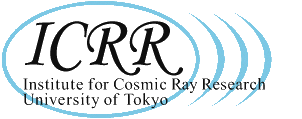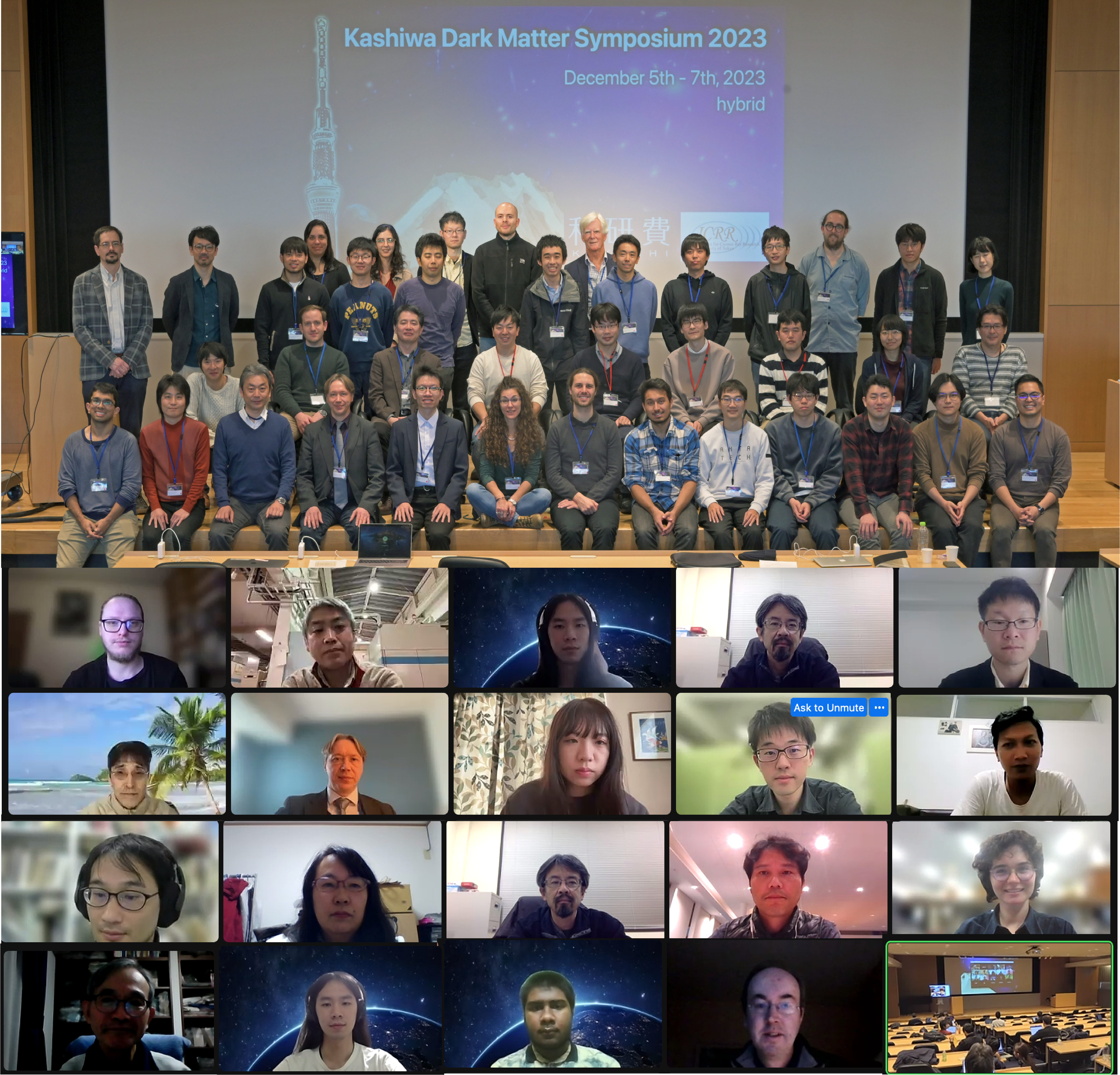
KASHIWA DARK MATTER SYMPOSIUM 2023
December 5 - December 8, 2023
hybrid #dm2023kashiwa (opens in a new tab)

Updates
Thanks for your participation in the Kashiwa Dark Matter Symposium 2023!

- 2023-12-08: All talk slides are now available in the talk list. If your slides are not there, or if you do not want to share your slides on the website, please let us know.
- 2023-12-01: We sent inportant information about the symposium to all registered participants. If you have not received it, please contact us at loc@kashiwa-darkmatter-symposia.org.
- 2023-12-01: Poster pitches are getting ready. Please check the Youtube links in the poster list.
- 2023-10-19: Talk and poster lists are updated.
- 2023-10-12: The banquet has been rescheduled for (December 7, 18:00 - 20:00). If you would like to change your participation or not, please update your details from the link sent to you after registration.
- 2023-09-19: Abstract submission deadline is extended to September 29, 2023, 23:59 (UTC).
- 2023-08-25: Update the invited speaker list.
- 2023-08-07: Registration is now open. Please register here (opens in a new tab).
RATIONALE
We are happy to announce the fifth Kashiwa Dark Matter symposium at the Institute for Cosmic Ray Research of the University of Tokyo. The symposium will take place in-person at the University of Tokyo Kashiwa Library Media Hall.1 The symposium will be held fully hybrid, allowing a worldwide inclusive and eco-friendly participation in an ongoing pandemic.
The Kashiwa Dark Matter symposium series brings regularly together international researchers from all relevant experimental and theoretical fields in current and future dark matter searches. This year, the symposium will include a focused session on searches for quantum sensors and astrohysical probes of dark matter.
MAIN TOPICS
- Dark matter theory
- Collider experiments for dark matter searches
- Dark matter direct detection experiments (LUX-ZEPLIN and Panda-X, TBD)
- Dark matter indirect detection experiments
- Astrophysical and cosmological constraints on dark matter
- Quantum sensors and astrophysical probes of dark matter
REGISTRATION AND CALL FOR ABSTRACTS
Please register here (opens in a new tab). For on-site participation, a conference fee of 2000¥ is charged in cash at the registration desk. There is no registration fee for online participation. In-person participation is limited on first-come-first-serve basis. As long as the option of in-person participation is available, in-person participation is guaranteed after completing the registration.
Oral presentations can be given in person or online. Posters will only be presented online, and include a max. 2-minute prerecorded flash-talk. Oral presentations are 10 minutes with 3 minutes Q&A. Applicants for contributed presentations will be notified on October 6, 2023 on the presentation's acceptance.
- Abstract submission deadline:
September 15, 2023, 23:59 (UTC)September 29, 2023, 23:59 (UTC) - Registration deadline: November 5, 2023, 23:59 (UTC)
INVITED SPEAKERS
- Jeff Shahinian (University of Pennsylvania)
- Florian Jörg (Max Planck Institute for Nuclear Physics)
- Sergey Burdin (University of Liverpool)
- Qiuhong Wang (Fudan University)
- Nagisa Hiroshima (University of Toyama)
- Ariane Dekker (Kavli Institute for Cosmological Physics, University of Chicago)
- Kaloian Lozanov (Kavli IPMU)
- Andrew Eberhardt (Kavli IPMU)
- Yuichiro Tada (Nagoya University)
- Tomomi Sunayama (University of Arizona)
- Ryo Kato (Osaka Metropolitan University, Kumamoto University)
- Devon Powell (MPA)
- Xing Fan (Northwestern University)
- Aaron Chou (Fermilab)
- Gray Rybka (University of Washington)
SCHEDULE AND ON-SITE VENUE
The symposium will take place between:
- Day1: Dec. 5 (Tue), 15:00 - 19:00
- Day2: Dec. 6 (Wed), 09:30 - 18:35
- Day3: Dec. 7 (Thu), 09:30 - 18:00
- Day4: Dec. 8 (Fri), 09:30 - 13:30
ON-SITE VENUE
The on-site symposium will take place at Kashiwa Library Media Hall of the University of Tokyo, Kashiwanoha Campus (5-1-5, Kashiwanoha, Kashiwa-shi, Chiba, 277-8584, Japan).

SCIENTIFIC ORGANISING COMMITTEE
- Kohei Hayashi (NIT, Sendai College/ICRR, the University of Tokyo; co-chair)
- Kento Asai (ICRR, the University of Tokyo; co-chair)
- Shunichi Horigome (Kavli IPMU, the University of Tokyo; co-chair)
- Shoji Asai (The University of Tokyo/CERN)
- Tobias Binder (Technische Universität München)
- Shion Chen (ICEPP, the University of Tokyo)
- Elisa G. M. Ferreira (Kavli IPMU, the University of Tokyo)
- Masahiro Ibe (ICRR/Kavli IPMU, the University of Tokyo)
- Masahiro Kawasaki (ICRR/Kavli IPMU, the University of Tokyo)
- Hidetoshi Kubo (ICRR, the University of Tokyo)
- Shigeki Matsumoto (IPMU, the University of Tokyo)
- Kentaro Miuchi (Kobe University)
- Shigetaka Moriyama (ICRR/Kavli IPMU, the University of Tokyo)
- Satoshi Shirai (Kavli IPMU, the University of Tokyo)
- Masahiro Teshima (ICRR/Max Planck Institute for Physics)
- Masaki Yamashita (Kavli IPMU, the University of Tokyo)
- Tatsuo Yoshida (Ibaraki University)
LOCAL ORGANISING COMMITTEE
- Kohei Hayashi (NIT, Sendai College/ICRR, the University of Tokyo; co-chair)
- Kento Asai (ICRR, the University of Tokyo; co-chair)
- Shunichi Horigome (Kavli IPMU, the University of Tokyo; co-chair)
- Tobias Binder (Technische Universität München)
LOCAL SUPORTERS
-
Ryuji Takeishi (ICRR, the University of Tokyo)
-
Joshua Baxter (ICRR, the University of Tokyo)
-
Takumi Itokawa (ICRR, the University of Tokyo)
-
Bruna Araujo (Kavli IPMU, the University of Tokyo)
-
Midori Sugahara (ICRR, the University of Tokyo; secretary)
-
Akiko Takagi (ICRR, the University of Tokyo; secretary)
-
Ryoko Shiraga (ICRR, the University of Tokyo; secretary)
CODE OF CONDUCT
(Adapted from SAZERAC (opens in a new tab)) Attendance at the Kashiwa Dark Matter symposium 2023 is a privilege, and attendees are expected to behave professionally. The symposium organisers are committed to providing an atmosphere that encourages the free expression and exchange of scientific ideas.
By participating in the Kashiwa Dark Matter symposium 2022 as an attendee or presenter, you agree to abide by this code of conduct.
Failure to adhere to this code of conduct in all circumstances related to the symposium,
including in the online sessions, or any in person, telephone, or other electronic communication, will result in removal from all symposium events.
Our scientific community values all members, regardless of (alphabetically) age, cultural background, disability, ethnicity, gender identity,
marital status, nationality, physical appearance, political affiliation, pregnancy, race, religious beliefs, sexual orientation, socio-economic status, and status as a caregiver (including as a parent).
The ability to allow our community to share its research results and promote the careers of junior attendees depends critically on maintaining a culture of inclusivity, where all voices are respected and heard.
The symposium organisers will not tolerate verbal, nonverbal harassment or bullying of any kind and will give high priority on eliminating sexual harassment in any form from the workplace. Behavior and language acceptable to one person may not be to another.
Members must make every effort to ensure that words and actions communicate respect for others, regardless of opinion regarding the person or their scientific results.
During symposium sessions, the Session Chair is in charge. Speakers must keep to their allotted time, ideally using a timer.
If they exceed their time, their question time will be reduced, and if they speak through all of the question time, they will be disconnected.
As listener, when asking questions to speakers, please be professional, courteous, and polite.
If a participant engages in obvious harassing behavior during the presentations, the Chairs may take any action they deem appropriate, including warning the offender or removing them from the conference.
Participants who believe that they have witnessed or been negatively impacted by a possible violation of the Code of Conduct
should contact the Equal Opportunites Responsible by emailing shunichi.horigome@ipmu.jp to initiate a complaint, including any available evidence (e.g., screenshots) in their email.
The Equal Opportunites Responsible will treat the appeal at maximum discretion and anonymity when discussing with SOC.
If a majority of the SOC concurs that this code has been violated, the offender will be immediately removed from all symposium-related events.
The offender will then be contacted by the SOC, and will have the opportunity to appeal the decision.
This appeal will be considered by the SOC, whose decision will be final.
SPONSORS
This symposium is supported in part by:
- MEXT Grant-in-Aid for Scientific Research on Innovative Areas:
- 19H05802 for Shigetaka Moriyama (co-PI, main hosts)
- 18H05542 for Masahiro Ibe (PI)
- Grant-in-Aid for Scientific Research (S):
- 23H05430 for Hidetoshi Kubo (PI, main hosts)
- Grant-in-Aid for Scientific Research (A):
- 22H00127 for Masaki Yamashita (PI)
- 20H00153 for Shigeki Matsumoto (co-I)
- Grant-in-Aid for Scientific Research (B):
- 20H01895 for Shigeki Matsumoto (PI), Kohei Hayashi (co-PI)
- Grant-in-Aid for Scientific Research (Early-Carrer Scientiests):
- 21K13909 for Kohei Hayashi (PI)
- 23K13097 for Kento Asai (PI)
- 23K13098 for Shunichi Horigome (PI)
- Grant-in-Aid for Transformative Research Area A (Open-solicited Research):
- 23H04009 for Kohei Hayashi (PI)
and the grant for ICRR’s Fiscal Year 2023 Inter-University Research Program (PI: Kohei Hayashi)
Footnotes
-
Depending on the development of the COVID-19 pandemic, the in-person conference part may have to be revisited. Under any circumstance, the in-person conference will be conducted strictly following the guidelines by the University of Tokyo for preventing the spread of COVID-19 (opens in a new tab). ↩